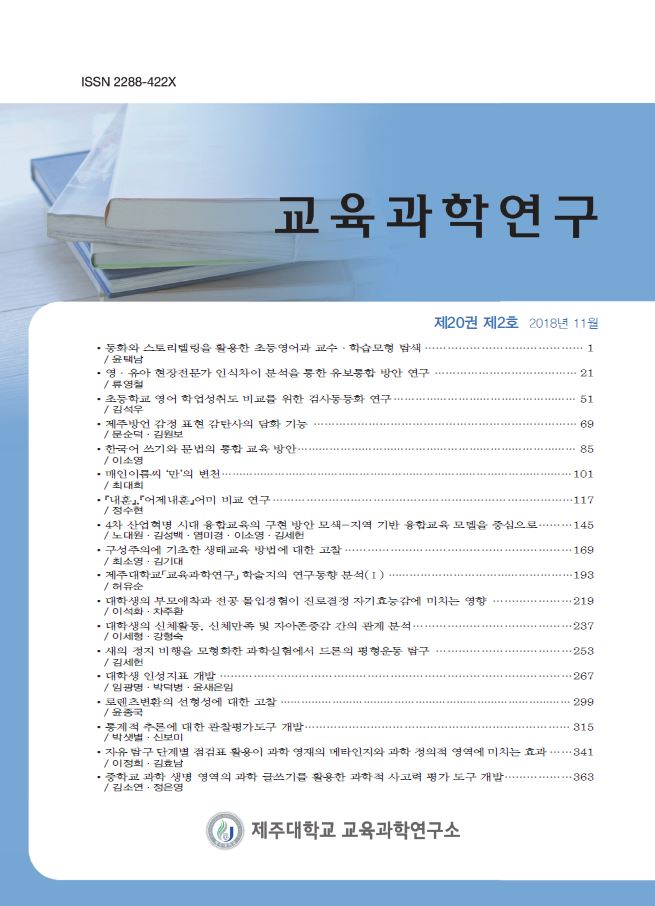학술논문
제주방언 감정 표현 감탄사의 담화 기능
이용수 32
- 영문명
- The Discourse Function of Emotional Exclamations in the Jeju Dialect
- 발행기관
- 제주대학교 교육과학연구소
- 저자명
- 문순덕(Moon Soondeok) 김원보(Kim Wonbo)
- 간행물 정보
- 『교육과학연구』제20권 제2호, 69~84쪽, 전체 16쪽
- 주제분류
- 사회과학 > 교육학
- 파일형태
- 발행일자
- 2018.11.30
4,720원
구매일시로부터 72시간 이내에 다운로드 가능합니다.
이 학술논문 정보는 (주)교보문고와 각 발행기관 사이에 저작물 이용 계약이 체결된 것으로, 교보문고를 통해 제공되고 있습니다.

국문 초록
국어문법에서 감탄사는 감정 감탄사, 의지 감탄사로 분류하는 것이 일반적다. 감탄사는 구어 표현에서 자연스럽게 발화되므로, 문법 의미보다는 담화 의미로 해석할 때 각 단어의 의미가 분명해진다. 이에 감정 표현의 감탄사는 발화 상황에서 그 의미가 좀 더 명확해지므로, 담화 의미로 접근하는 것이 감정 감탄사의 의미를 정확하게 해석할 수 있다. 따라서 이 글은 제주방언 감정 표현 감탄사인 ‘ᄋᆞ따가라, 메께라, 메, ᄎᆞ마가라’ 등을 대상으로 담화 의미를 살펴보았다. 제주방언 감정 표현 감탄사 ‘ᄋᆞ따가라’는 나무람, 비난, 책망, 대화중지, 대화거부, 부정 등의 담화 의미를 지니고 있는데, 이 의미들은 후행 발화에 따라 달라진다. 제주방언 감정 표현 감탄사 ‘메께라’에는 강한 부정, 거부, 책망, 나무람, 비난, 못마땅함, 단정 등의 담화 의미가 내포되어 있다. 제주방언 감정 표현 감탄사 ‘메’는 강한 부정, 요구 거절의 담화 의미로 쓰인다. 제주방언 감정 표현 감탄사 ‘ᄎᆞ마가라’에는 화자의 강한 부정, 거부, 책망, 단정 등의 담화의미가 내포되어 있다. 따라서 제주방언 감정 표현 감탄사 ‘ᄋᆞ따가라, 메께라, 메, ᄎᆞ마가라’ 등은 상대방의 행동을 나무랄 때, 화자의 맘에 들지 않을 때(흡족하지 않은 상태) 등 화자의 입장에서 청자의 말이나 행동을 비난하는 담화 의미가 내포되어 있다.
영문 초록
In the Korean grammar, it is common to classify exclamations as either an emotional or a wilful exclamation. Since an exclamation is spontaneously spoken in the colloquial language, its meaning becomes clear when it is dealt with from the perspective of the discourse meaning rather than the grammatical meaning. Therefore, since the function of exclamations expressing emotion gets clearer in the utterance situation, a discourse approach to their meaning can help us interpret the meaning of an emotional exclamation more accurately. Therefore, this study has examined the discourse meanings of the emotional exclamations in the Jeju dialect such as ‘ɔttagala(ᄋᆞ따가라: ɔ for ᄋᆞ in the Jeju dialect)’, ‘mekkela(메께라)’, ‘chɔmagara(ᄎᆞ마가라)’, and ‘me(메)’. The exclamation ‘ɔttagala’ expressing emotions in the Jeju dialect indicates the discourse meaning of scolding, blame, reproof, interruption or refusal of conversation, or denial and the trailing speech decides one of these meanings. Jeju dialect emotional exclamations such as ‘mekkela’ and ‘mesikela(메시께라)’ convey the discourse meaning of ‘strong denial, rejection, reproof, scolding, criticism, dissatisfaction and assertiveness’. The exclamation ‘chɔmagala’ in the Jeju dialect shows the discourse meaning of a speaker’s strong denial, rejection, reproof and determination. The Jeju dialect emotional expression ‘me’ has the discourse meaning of strong denial and demand rejection. Therefore, the emotional expressions ‘ɔttagala’, ‘mekkela’, ‘chɔmagara’, and ‘me’ in the Jeju dialect are used to imply the discourse meaning that condemns a listener’s words or actions in a speaker s position, especially when a speaker blames or does not like a listener’s act.
목차
Ⅰ. 서 론
Ⅱ. 감정 표현 감탄사의 담화 기능
Ⅲ. 결 론
키워드
해당간행물 수록 논문
- 4차 산업혁명 시대 융합교육의 구현 방안 모색 -지역 기반 융합교육 모델을 중심으로
- 자유 탐구 단계별 점검표 활용이 과학 영재의 메타인지와 과학 정의적 영역에 미치는 효과
- 중학교 과학 생명 영역의 과학 글쓰기를 활용한 과학적 사고력 평가 도구 개발
- 초등학교 영어 학업성취도 비교를 위한 검사동등화 연구
- 『내훈』, 『어제내훈』 어미 비교 연구
- 영·유아 현장전문가 인식차이 분석을 통한 유보통합 방안 연구
- 대학생 인성지표 개발
- 통계적 추론에 대한 관찰평가도구 개발
- 대학생의 신체활동, 신체만족 및 자아존중감 간의 관계 분석
- 한국어 쓰기와 문법의 통합 교육 방안
- 새의 정지 비행을 모형화한 과학실험에서 드론의 평형운동 탐구
- 매인이름씨 ‘만’의 변천
- 대학생의 부모애착과 전공 몰입경험이 진로결정 자기효능감에 미치는 영향
- 구성주의에 기초한 생태교육 방법에 대한 고찰
- 로렌츠변환의 선형성에 대한 고찰
- 제주대학교 「교육과학연구」 학술지의 연구동향 분석(Ⅰ)
- 제주방언 감정 표현 감탄사의 담화 기능
- 동화와 스토리텔링을 활용한 초등영어과 교수·학습모형 탐색
참고문헌
관련논문
사회과학 > 교육학분야 NEW
- 청소년의 비행 문제 감소를 위한 온라인 메타버스 형식 기반 해결 중심 집단 프로그램의 개발
- 대학생의 개인적 공정세상신념과 정신적 안녕감의 관계 : 감사, 친사회적 행동의 매개효과
- 부모보고용 유아 사회인지 체크리스트 개발 및 타당화
최근 이용한 논문
교보eBook 첫 방문을 환영 합니다!

신규가입 혜택 지급이 완료 되었습니다.
바로 사용 가능한 교보e캐시 1,000원 (유효기간 7일)
지금 바로 교보eBook의 다양한 콘텐츠를 이용해 보세요!





